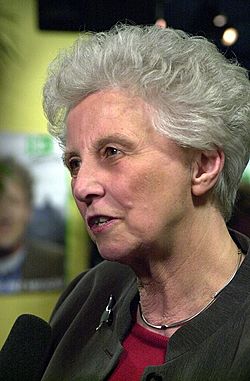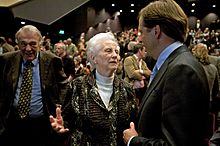Els Borst facts for kids
Quick facts for kids
Els Borst
|
|
|---|---|

Els Borst in 2002
|
|
| Deputy Prime Minister | |
| In office 3 August 1998 – 22 July 2002 Serving with Annemarie Jorritsma
|
|
| Prime Minister | Wim Kok |
| Preceded by | Hans Dijkstal Hans van Mierlo |
| Succeeded by | Eduard Bomhoff Johan Remkes |
| Member of the House of Representatives | |
| In office 19 May 1998 – 3 August 1998 |
|
| Parliamentary group | Democrats 66 |
| Parliamentary leader in the House of Representatives |
|
| In office 19 May 1998 – 30 May 1998 |
|
| Preceded by | Thom de Graaf |
| Succeeded by | Thom de Graaf |
| Parliamentary group | Democrats 66 |
| Leader of the Democrats 66 | |
| In office 15 February 1998 – 30 May 1998 |
|
| Preceded by | Hans van Mierlo |
| Succeeded by | Thom de Graaf |
| Minister of Health, Welfare and Sport |
|
| In office 22 August 1994 – 22 July 2002 |
|
| Prime Minister | Wim Kok |
| Preceded by | Jo Ritzen (Ad interim) as Minister of Welfare, Health and Culture |
| Succeeded by | Eduard Bomhoff |
| Personal details | |
| Born |
Else Eilers
22 March 1932 Amsterdam, Netherlands |
| Died | 8 February 2014 (aged 81) Bilthoven, Netherlands |
| Political party | Democrats 66 (from 1968) |
| Spouse |
Jan Borst
(m. 1960; |
| Children | 3 children |
| Relatives | Piet Borst (brother in law) |
| Alma mater | University of Amsterdam (Bachelor of Medical Sciences, Master of Medicine, Doctor of Medicine, Doctor of Philosophy) |
| Occupation | Politician · Civil servant · Physician · Medical researcher · Nonprofit director · Academic administrator · Hospital administrator · Professor |
Else "Els" Borst-Eilers (born March 22, 1932 – died February 8, 2014) was a Dutch politician and doctor. She was a member of the Democrats 66 (D66) party. She was given the special title of Minister of State in 2012.
Els Borst started her career as a medical researcher and then became a doctor. She also directed a blood bank and managed a hospital. Later, she became a professor of medical ethics. In 1994, she became the Minister of Health, Welfare and Sport. She also led her party, D66, and became Deputy Prime Minister in 1998. She retired from politics in 2002. After retiring, she continued to work for various health organizations. She passed away on February 8, 2014, in her home.
Contents
Early Life and Education
Els Borst went to the Barlaeus Gymnasium in Amsterdam. She finished school there in 1950. After that, she studied medicine at the University of Amsterdam from 1950 to 1958. She earned her medical degree in 1958.
She then worked as a resident doctor in Amsterdam. She specialized in treating children (pediatrics) and in blood-related medicine (immunohaematology). In 1965, she began working on her doctoral degree at Utrecht University. She researched how to prevent certain blood problems in babies. In 1972, she received her PhD from the University of Amsterdam.
Career in Medicine and Public Health
In 1969, Els Borst became the head of the Bloodbank at the University Medical Center Utrecht. Later, in 1976, she became the medical director of that hospital. She left this role in 1986 to become the vice-chair of the Health Council.
From 1992, she also worked as a professor at the University of Amsterdam. She taught about how to evaluate medical treatments. At the Health Council, she led committees on important topics like immunisation, genetics, and medical ethics. She also held other key roles in the medical field.
In 1968, she joined the Democrats 66 political party. She was an active member, helping the party even when it was not very popular.
Political Career Highlights
In 1994, Els Borst became the Minister of Health for the D66 party. She was part of the first government led by Wim Kok. As a minister, she was known for two main things. She introduced new laws about medical ethics. She also tried to improve the healthcare system for the country's aging population.
In 2001, she helped pass a law about euthanasia. This law allowed it under very strict conditions. Doctors had to follow many rules and report everything. This law is seen as her most important political achievement.
Other important decisions she made include:
- In 1994, she made patient rights stronger. Patients gained the right to get information and keep their medical details private. They also got the right to refuse medical treatment.
- In 1996, she introduced the law on organ donation. This law asks all Dutch citizens at age 18 if they want to be organ donors.
- In 2001, a law was passed about using fetal tissue for scientific research. This was allowed if the parents agreed.
- In 2002, she stopped the practice of xenotransplantation. This is using animal organs for human transplants.
She also faced challenges in preparing the Dutch healthcare system for an older population. She wanted to combine the public and private health insurance systems. This would make sure everyone paid the same for the same care. Even though her ministry's budget grew, she had to limit hospital spending. This led to long waiting lists for some medical procedures. Some people criticized her for how she managed the healthcare system.
In the 1998 elections, Els Borst became the top candidate for D66. The party lost some seats, going from 24 to 14. However, she remained the Minister of Health. She also became Deputy Prime Minister. She served in the second government led by Wim Kok.
In 1999, she faced a debate in parliament. This was after an inquiry into a plane crash. The committee said her ministry did not respond well to the health problems of the crash survivors. Parliament decided not to remove her from her position.
In 2001, she caused some controversy in an interview. She said "It has been done" about the euthanasia law. This phrase is from the Bible and upset some religious parties. She apologized to parliament for her words.
During her time as minister, she became a member of the Institute of Medicine in the United States. She also became a fellow of the Royal College of Physicians in Scotland.
Later Life and Recognition

Before the 2002 elections, Els Borst decided to retire from politics. On February 8, 2003, she became an honorary member of the Democrats 66 party.
After leaving politics, she held many important roles in public life. She was a member of committees for national remembrance days. She also continued to work in the medical field. She chaired the board of NIVEL, a research institute. She also led the Federation of Dutch Cancer Patients Organizations. And she chaired the advisory board of the Brain Foundation of the Netherlands.
Death
Els Borst passed away on February 8, 2014, at her home in Bilthoven.
Decorations
| Honours | ||||
| Ribbon bar | Honour | Country | Date | Comment |
|---|---|---|---|---|
| Knight of the Order of the Netherlands Lion | Netherlands | 10 May 1989 | ||
| Officer of the Order of Orange-Nassau | Netherlands | 10 December 2002 | ||
| Honorific Titles | ||||
| Ribbon bar | Honour | Country | Date | Comment |
 |
Minister of State | Netherlands | 21 December 2012 | Style of Excellency |
| Awards | ||||
| Ribbon bar | Awards | Organization | Date | Comment |
| Honorary Member | Democrats 66 | 10 February 2003 | ||
 | Emma Amos |
 | Edward Mitchell Bannister |
 | Larry D. Alexander |
 | Ernie Barnes |

